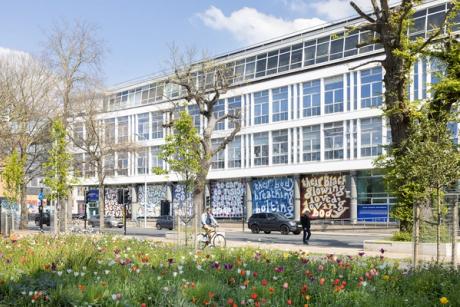
The University of Brighton has announced it is closing the Brighton Center for Contemporary Art (BCCA), saying it faces “very significant challenges” in terms of income and expenditure, including “the tuition fee freeze for almost a decade” as well as “high levels of inflation and high energy costs”.
The gallery, which opened in 2019, is one of the few with a focus on visual arts in the south coast city. Over the past five years, exhibitions have included those by Bill Lynch and Billie Zangewa – their first in a British institution, as well as major outside commissions by Jade Montserrat and Alexandre da Cunha, and exhibitions by Amalia Pica, Resolve Collective and Lloyd Corporation, among others.
In an email sent to stakeholders this week, Professor Tamar Jeffers McDonald, Dean of the University’s School of Art and Media, acknowledges that the BCCA “has established positive connections with communities and practitioners locals, and brought the work of international artists to the city”. However, Jeffers continues, “Given the competing demands on our resources, we must now focus on our core business of providing the best possible educational experience for all of our students, while continuing to meet our regional priorities and ambitions. through research and innovation. ”
A university spokeswoman echoed the dean’s reasons, citing “financial challenges which mean we need to cut spending”.
Ben Roberts, the director of the BCCA, said the decision to close “came out of the blue”. The gallery underwent an internal review a year ago, which Roberts said was “very positive.” A university spokeswoman said the review “explored the future of BCCA and the need to increase revenue to ensure financial sustainability”. She adds: “However, unprecedented inflationary pressures have resulted in the university no longer being able to invest in the gallery.”
Earlier this month, the university began a period of consultation with staff from all departments; 400 people have been told their jobs could be at risk as the university seeks to save £17.9million. More than 100 employees are expected to lose their jobs when the consultation ends on June 20.
According to a report published in the Times Higher Education supplement, members of the local branch of the University and College Union said they believe the cuts could have been avoided with better financial management, pointing to a costly redevelopment of the campus which involved £17million spent to acquire the site of a former gymnasium.
Roberts says the whole process felt “very top-down.” He adds: “They call it a consultation, but it doesn’t look like it. There was no discussion of what we could do to cut costs or try to be part of a solution. Cuts to Canada Council funding “have made some difference,” Roberts says. “There is less and less money for artists just to do work or for galleries to put on exhibitions.”
Turner Prize-winning Helen Cammock, who studied in Brighton 30 years ago and splits her time between the South Coast and London, had been commissioned to create 30 pieces for the BCCA’s facade, which was due to go on display this summer. This project has now been retired, although there are tentative plans for it to be shown elsewhere on the South Coast.
Other exhibitions in the pipeline which have now been canceled include that of Tamara Henderson, which was a joint commission with the Camden Arts Centre, and the first major screening of early films and performances made at the University of Brighton by Helen Chadwick.
“My commission was an ode to Brighton,” says Cammock. “It’s frustrating for me as an artist, but the bigger picture is much more disturbing. This government is decimating the arts, pushing them to the limit. The whole brain drain is really unhealthy. It’s not just unhealthy for the context, it’s unhealthy for society. We need artists and we need art.
Cammock, who ran Brighton Photo Fringe, says there have been “a lot of mistakes in the context of contemporary art” in terms of visual arts funding in Brighton over the years. “Closing BCCA is a very big mistake,” she adds.
The artist notes that many local projects manage to spring up in Brighton with very little or no money – “it’s the essence of what Brighton has always been”, she says. “There are a lot of street performances, a lot of outdoor things and a lot of concert halls. And I think contemporary art has been forgotten.
